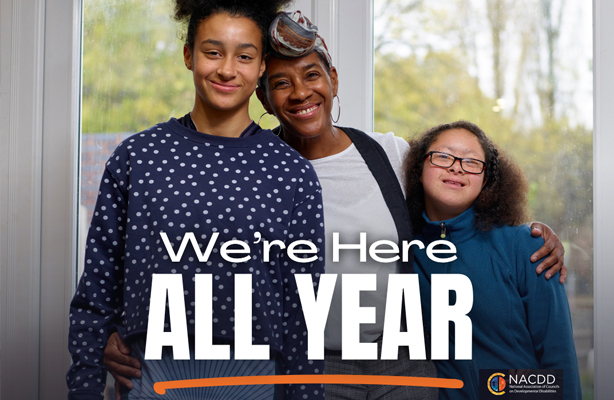Home > Our Blog
March is Developmental Disabilities Awareness Month

Posted: March, 2025
We're Here All Year
March is Developmental Disabilities Awareness Month (DDAM), a time we here at Crest Services and people everywhere celebrate the achievements of individuals with developmental disabilities. This year's theme, "We're Here All Year," led by the National Association of Councils on Developmental Disabilities (NACDD), calls on all of us to build communities where everyone, regardless of ability, truly belongs.
The message is clear: People with developmental disabilities are already part of our communities—working, learning, volunteering, and making a difference. They don't need to be included because they already belong.
How It All Began
Developmental Disabilities Awareness Month was established in 1987 through a presidential proclamation by President Ronald Reagan. Its purpose is to promote the inclusion of people with disabilities in all aspects of society. It's about celebrating differences and ensuring that individuals with developmental disabilities can thrive at school, work, and in life.
What Are Developmental Disabilities?
According to Easterseals, developmental disabilities are conditions that occur from birth to early childhood, impacting day-to-day functioning and often being lifelong diagnoses. Common examples include:
- Autism Spectrum Disorder
- Cerebral Palsy
- Down Syndrome
- Hearing or Vision Loss
- Learning Disorders
- ADHD
Understanding the Causes
Developmental disabilities can arise from various factors, including genetics, complications during birth, or parental health and behaviors during pregnancy. In many cases, the exact cause is unknown.
The Prevalence of Developmental Disabilities
Developmental disabilities affect more people than many realize. According to the Centers for Disease Control and Prevention (CDC):
- Over six million Americans live with these conditions.
- 17% of children in the U.S. between the ages of three and 17 have one or more developmental disabilities.
These numbers highlight the need for accessible environments and opportunities year-round—not just in March.
Building Inclusive Communities Beyond March
True inclusion means more than awareness—it means action. Here are a few ways to build communities where everyone feels they belong:
- Advocate for Accessibility: Support businesses and public spaces that prioritize accessibility.
- Promote Inclusive Hiring: Employers, consider offering more job opportunities for people with disabilities.
- Foster Social Connections: Invite people with developmental disabilities to community activities. Small actions can make a big difference.
Making a Difference Year-Round
As we recognize Developmental Disabilities Awareness Month, Crest Services remains dedicated to supporting individuals with developmental disabilities—not just in March, but all year long. Together, we can build communities where everyone has a chance to thrive.
Seven Trends to Support Individuals with IDD

Posted: March, 2025
Exploring Key Trends in IDD Services for 2025
The way we support individuals with intellectual and developmental disabilities (IDD) is evolving in meaningful ways. Innovations in technology, a growing focus on holistic well-being, and stronger advocacy efforts are helping to create more inclusive opportunities than ever before.
As expectations shift and new resources emerge, we have a unique opportunity to embrace these changes and enhance the lives of those we support. Here are seven key trends shaping the future of IDD services.
1. Person-Centered Support Leading the Way
Empowering individuals with IDD remains at the heart of care, with a strong focus on:
- Tailoring services to individual needs, goals, and preferences
- Ensuring people with IDD are active participants in decision-making
- Expanding self-advocacy and independent living opportunities
2. Technology Transforming Independence
Assistive technology is making daily life more accessible, including:
- Smart home devices that promote independent living
- Communication tools that enhance connection and engagement
- Health-monitoring apps that improve well-being
3. A Holistic Approach to Health and Wellness
Supporting overall well-being means addressing more than just medical needs, with an emphasis on:
- Integrated care models that include mental health, nutrition, and fitness
- Preventive care tools like the Health Risk Screening Tool (HRST)
- A stronger focus on emotional and social wellness
4. Elevating the IDD Support Workforce
Dedicated direct support professionals (DSPs) are the foundation of quality care. This year, we will see:
- Increased efforts in recruitment and retention
- Expanded training in trauma-informed care and person-centered thinking Professional development initiatives to improve service quality
5. Stronger Advocacy for Inclusion and Rights
The push for equity and inclusion continues, with efforts focused on:
- Expanding workplace accommodations and employment opportunities
- Making public spaces more accessible
- Strengthening inclusive education programs
6. Data-Driven Support for Better Outcomes
Technology and analytics are shaping the future of IDD services by:
- Personalizing care plans based on real-time insights
- Enhancing safety, health, and independence
- Improving service delivery through data-backed decisions
7. More Support for Families and Caregivers
Families play a vital role in supporting individuals with IDD and will benefit from:
Building a Better Future—Together
The future of support for individuals with intellectual and developmental disabilities is bright, and collaboration will help make it a reality. By embracing these trends, we can create a world where every person's abilities are celebrated.
Learn how Crest Services fosters independence, dignity, and self-worth within our communities. www.crestservices.org
A PARENT'S PERSPECTIVE: Navigating the Future

Posted: January, 2025
As parents of an adult child with special needs, we’re always looking ahead. How can we ensure Alex is secure and cared for when we’re no longer here? Alex, our 38-year-old son with developmental disabilities, lives at home and receives hourly Home and Community-Based Services. Late in my career as a healthcare executive, I shifted my focus to working with individuals with physical and intellectual challenges to better understand the complexities Alex will face ‘in the system’ as he grows older.
Unique Challenges for Parents of Children with Special Needs
We can foresee a time when Alex’s needs may no longer be safely met at home, even with services. There will also come a day when neither of us will be present in his life. For parents of children with special needs, these thoughts weigh heavily. While all parents worry about their children’s futures, the complexity of securing appropriate services and planning for a safe, fulfilling life adds an extra layer of concern.
Navigating a Complex System
Like many families with special needs children, we became a single-income household. As a result, all three of us may eventually depend on government services. Over the years, we’ve learned to navigate Medicaid, Medicare, Social Security Disability Insurance (SSDI), trusts, and more. It’s been a journey of study, trial and error, and seeking trusted information.
The path to securing Alex’s future isn’t always clear, but we’re determined to find the right solutions. This means diving into the complexities of the system, advocating for the services Alex needs, and continuously adjusting our plans to reflect his evolving needs.
Alex’s Journey Through the “Circle of Life”
Services for individuals with developmental disabilities are often provided based on age, income, and specific needs—factors that shift over time. Borrowing from The Lion King, this journey feels like a “Circle of Life,” with Alex’s cycle having unfolded in these key stages:
- Early Years: Receiving services from about two years old until high school graduation at age 19.
- Vocational Training: Entering an eight-week program post-high school to develop independent living skills. Unfortunately, he was unsuccessful in this program.
- Intellectual Stimulation: Pursuing college courses, adult education, and involvement in programs such as the Kiwanis Aktion Club, where he has served as treasurer and secretary.
- Current Life: Living at home while becoming eligible for Home and Community-Based Services, Medicare, Medicaid, and SSDI.
Each stage brought new opportunities and challenges, requiring us to adapt and keep moving forward.
Planning for the Future: Hard Choices and Heartfelt Decisions
As a middle-aged man, Alex has many years ahead of him, so we are exploring long-term solutions that provide person-centered services, including:
- Group Homes, Host Homes, and Family Host Homes: Services funded by government Medicaid programs administered through the state, available once assets are “spent down.”
- Establishing a Medical and Financial Power of Attorney: Identifying a younger family member willing to take on this role when we are no longer able to assist Alex. This involves creating a legal agreement.
- Engaging a Financial Advisor: Working with a specialist to evaluate our assets and establish a small trust to ensure Alex retains access to essentials like a computer and internet access.
These decisions are never easy, but they’re vital to ensuring Alex’s security and well-being.
Finding Hope Through Planning
To parents walking this path, I send my best wishes. Though it’s challenging, the process is filled with moments of pride and joy. Each plan we make brings us closer to ensuring Alex’s future is bright and secure.
If you’re navigating similar challenges, we’d love to hear your story. Together, we can find strength in knowing we’re not alone. Planning gives us hope—for Alex, our family, and others. It’s a labor of love—one we face with determination, courage, and faith in a brighter future.

